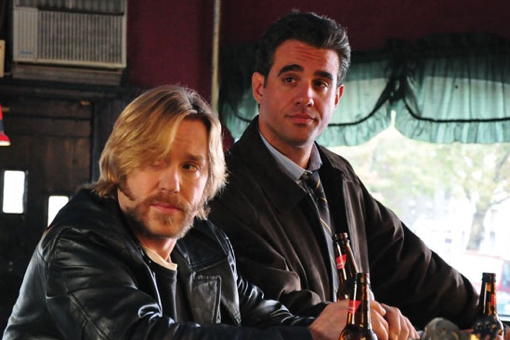By Pam Glazier · January 9, 2012

Trying to get excited about Michael Cuesta’s new film Roadie is pretty difficult. It’s one of those movies that tries to capture the smallness of an unimportant man. He wasn’t beaten down by life, nor did it bolster him up, instead his life is characterized by a wan or bland quality that stems from all of the various choices he has made. In this film, Jimmy Testagros (Ron Eldard) has been working as a roadie for the Blue Oyster Cult for 25 years. He left his home town straight out of high school and never looked back. But when the band fires him, it’s the only place he’s got left. And so he returns, under the guise of finally getting a moment to catch up with old friends.
Jimmy begins to invent success and achievements in order to impress his friends and family, and he keeps lying in order to feel important. He wants his family, his neighbors, his old high school friends, to think that he is big—something better than the old life. This comes into conflict with reality because he really isn’t. Also, it’s a bit of a dick move to insist that everyone bow down and acknowledge that their lives suck compared to yours.
Despite Jimmy’s failures, he’s under the constant assumption that he would have been huge if life hadn’t screwed him over. Never mind that he couldn’t stick to any one thing, or put in the time, he was destined for greatness damn it. There’s a story point dealing with this particular character flaw that could’ve been milked for a lot of tragedy, but the filmmakers didn’t go there. And I couldn’t decide whether I liked that they went with the subtle approach, or if it made things feel bland. Whatever it was, there was something “off” enough to distract me out of the film.
At another point in the film, Jimmy’s mom asks him to ask the next-door neighbors for a stick of butter. Jimmy goes over there but can’t bring himself to knock on the door and just leaves. First off, why the hell is he weirded out enough to avoid knocking on the door. Second off, if it really is that much of a contentious conflict for the main character THEN WE WANT TO SEE THIS CRAP IN THE FILM!!!! DON’T CUT IT OUT!!!! And thirdly, one of those neighbors is seriously the most interesting character in the film—a chatty stroke victim who seemingly babbles away the meaning of life jovially while the non-understanding Jimmy stares at him, perplexed and uncomfortable.
And Jimmy’s mom is also a very interesting character: a staunch, do-it-herself type who is losing the ability to take care of herself. But these interactions are foregone in order to show Jimmy reliving his past with friends from high school. Situations like this should make you pick. Either cut out the interesting bits if they take away from your main story, or cut out your main story to focus on the interesting bits.
The things described above make me feel like the rewrite process of this film did not include asking “why” 800,000 times. And you sort of need that. Why do we care? Why would he do that? Why is he here now? Why is this an important part? Why am I not cutting this scene? You’ve got to be able to justify it all. It’s as intricate and annoying as a geometric proof, but just as necessary (geometric proofs are necessary, right?).
Here’s a prime example. The movie sets up the sense that Jimmy left her behind, but later it seems that she might have dumped him. This is never cleared up and seems kind of integral to what is going on between these characters. So again, the story seems to be frayed around the edges (which points to a need for a more thorough rewrite review process).
Despite all the things I didn’t like about this movie, there was an interesting choice to make Jimmy’s childhood nemesis *appear* to be an asshole while actually being the best person among the three childhood friends. He’s annoying and kind of jock-ish, but he stayed and married the girl and worked to support her and make her happy. Jimmy, the “hero,” left. He’s the schmuck. But the film takes sides in his favor, which is a cool statement regarding how all those interpersonal tangles can get all snarled up. Sometimes you just like an a-hole, even if it isn’t fair. And maybe that was supposed to be the microcosm for Jimmy’s life. He just liked the a-hole, and so he emulated him, and got screwed for it.
Overall this film was bleh. I wasn’t brought into the story enough to care about a self-serving fuck-up. Also, the acting was just good, adequate. It wasn’t enough to make up for the writing, which leaves something to be desired.